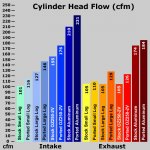I have a 65 Falcon with a 250 out of a 75 Granada. It has a Carter 1 bbl on it. The motor has less than 3000 miles on it since the rebuild as well as the carb. Since day one, I have not been able to get this carb to run worth a darn! From time to time I have read that members have had their head machined to accept a 2bbl carb. My question is, should I remove the head and take it to a machine shop for this work, or is there a source for heads that have already been worked and are for sale? Any suggestions will be greatly appreciated as this is my daily driver and I have got to get it running better than it does now, or I'm going to run it off a cliff!!! Thank you. Thomas Ft. Bragg NC
WANT TO ADD 2BBL CARB TO MY 250...
- Thread starter jugrnaut
- Start date

 Thanks again!
Thanks again!